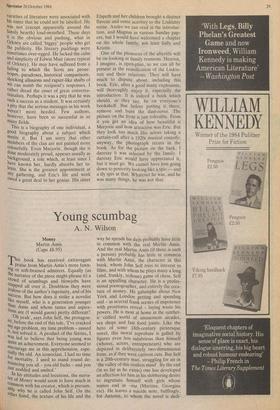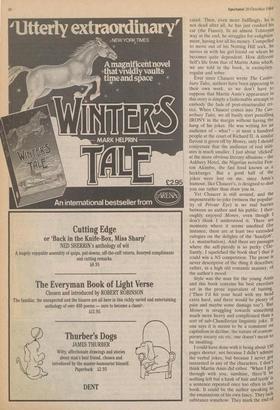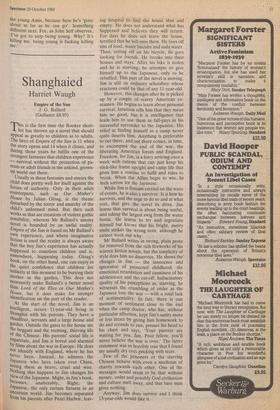Young scumbag
A. N. Wilson
Money Martin Amis (Cape £8.95)
This book has received extravagant praise from Martin Amis's more fawn- ing or soft-brained admirers. Equally (as the narrator of the piece might phrase it) a crowd of scumbags and blowjobs have ?rapped all over it. Doubtless they were Jealous of the author's ingenuity, and of his success. But how does it strike a novelist Irke myself, who is a generation younger than Amis and whose tastes and aspira- tions are (I would guess) pretty different? Oh yeah', says John Self, the protagon- ist, before the end of this tale, 'I've cracked !ItY age problem, my time problem – sussed it, not solved it. A product of the Sixties, I was led to believe that being young was quite an achievement. Everyone seemed to encourage me in this apprehension, espe- cially the old. An iconoclast, I had no time for mortality. I used to stand round de- nouncing you all – you old fucks – and you Just nodded and smiled.' In his attitudes and locutions, the narra- tor of Money would seem to have much in common with his creator, which is presum- ably why he is called John Self. On the °ther hand, the texture of his life and the way he spends his days probably have little in common with the real Martin Amis. And the real Martin Amis (if there is such a person) probably has little in common with Martin Amis, the character in this book, whom John Self tries to interest in films, and with whom he plays many a long (and, frankly, tedious) game of chess. Self is an appalling character. He is a profes- sional pornographer, and entirely the crea- ture of money. He galumphs about New York and London getting and spending and – as seyeral frank scenes of impotence with prostitutes reveal – laying waste his powers. He is most at home in the synthet- ic citified world of amusement arcades, sex shops and fast food joints. Like the hero of some 18th-century picaresque novel, this moral reprobate is gulled by figures even less salubrious than himself (whores, actors, entrepreneurs) who are depicted in deliberately two-dimensional form, as if they were cartoon cuts. But Self is a 20th-century man, struggling for air in 'the valley of this restless mind'. By the end (in so far as he exists) one has developed an affection for him in his slobbering desire to ingratiate himself with girls whose names end in –int/ (Martina, Georgina etc). He leaves a suicide note, bafflingly, for Antonia, to whom the novel is dedi- cated. Then, even more bafflingly, he is not dead after all, he has just crashed his car (the Fiasco). In an almost Tolstoyan way at the end, he struggles for enlighten- ment, having lost all his money. Compelled to move out of his Notting Hill sock, he moves in with his girl-friend on whom he becomes quite dependent. How different Self's life from that of Martin Amis which, we are told in the book, is exemplary, regular and sober.
Ever since Chaucer wrote The Canter- bury Tales, authors have been appearing in their own work, so we don't have to suppose that Martin Amis's appearance in this story is simply a fashionable attempt to embody the fads of post-structuralist cri- tics. When Chaucer comes into The Can- terbury Tales, we all busily start pencilling IRONY in the margin without having the hang of his jokes. He was writing for an audience of — what? — at most a hundred people at the court of Richard II. A similar flavour is given off by Money, only I should conjecture that the audience of real initi- ates is much smaller. I just about 'clicked' at the more obvious literary allusions — the Ashbery Hotel, the Nigerian novelist Fen- ton Akimbo, the fast food known as a • Seckburger. But a good half of the jokes were lost on me, since Amis's humour, like Chaucer's, is designed to shut you out rather than draw you in.
Yet Chaucer is still around, and the impenetrable in-joke (witness the popular- ity of Private Eye) is no real barrier between an author and his public. I thor- oughly enjoyed Money, even though I don't think I understood it. There are moments where it seems unedited (for instance, there are at least two extended eulogies on the delights of the `handjob', i.e. masturbation). And there are passages where the self-parody is so perky (De- fiantly, I squelched the book shut') that it could win a NS competition. The prose is never descriptive of the thing it describes; rather, in a high old romantic manner, of the author's mood.
Style was the man for the young Antis and this book contains his best exercises yet in the prose equivalent of butting. (`Then I'd hit your head with my head extra hard, and there would be plenty of pain and maybe some damage too'). But Money is struggling towards something much more heavy and complicated than a sort of sub-Chandlerian linguistic joke. If one says it is meant to be a comment on capitalism in decline ,• the nature of contem- porary society etc etc, one doesn't mean to be insulting. I could have done with it being about 150 pages shorter, not because I didn't admire the verbal jokes, but because I never got interested in any of the characters. I don't think Martin Amis did either. 'When I get through with you, sunshine, there'll be nothing left but a hank of hair and teeth' is a sentence repeated once too often in the book. It could be the author speaking to the emanations of his own fancy. They lack substance somehow. They mark the end of the young Amis, because here he's 'gone about as far as he can go'. Something different next. For, as John Self observes, `I've got to stop being young. Why? It's killing me, being young is fucking killing me.'




















































 Previous page
Previous page